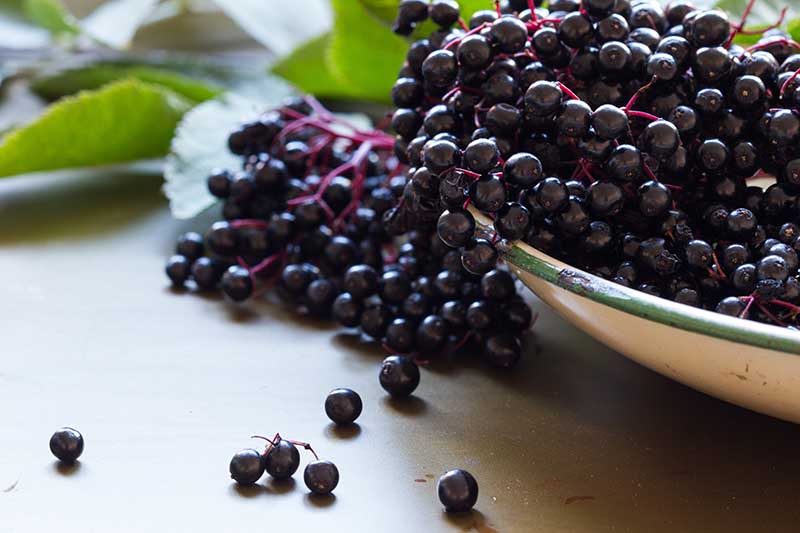In this article
The use of elderberries in human remedies has been on the rise over the past few years. You’ll find elderberry cough syrup on drug store shelves and elderberry jams and jellies floating around the grocery aisles. Not to mention, elderberry wine is quite popular. With so many elderberry products being available, it’s natural to assume that elderberries are safe for consumption. When it comes to your dog, however, that is not the case. The same can even be said for you if the elderberries are not properly ripened and cooked.
If you’ve wondered whether dogs can eat elderberries and if they are safe for them, the short answer is no. While properly ripened elderberries may be safe in very small quantities, the danger of your pet eating any part of the shrub or berries that aren’t properly prepared is too high. Let’s learn more about elderberries, the dangers they pose for your dog, and what to do if you think your dog has ingested the unripened berries or parts of the plant.

What Are Elderberries & Why Are They Dangerous?
Elderberry plants are part of the Sambuca family. These plants are found in several areas, including hiking trails and parks that you and your dog may frequent. The concerning part is the dangers that come from ingesting any part of this plant, including unripened berries. Elderberry plants contain cyanogenic glycosides including sambunigrin and prunasin. Amygdalin is a similar cyanogenic glycoside found in apple seeds,2 stone fruits, and almonds, all when chewed or ingested produce hydrogen cyanide. This production of cyanide can be fatal if not treated within an hour of ingesting it but signs can begin within 10 to 20 minutes. Luckily reports of poisoning by elderberries are not common.
There are several types of elderberry plants in the Sambuca family. These types include red, black, blue, and Sutherland Gold elderberries. Unfortunately, no elderberry plant should be considered safe, as roots, stems, leaves, bark and berries can all contain toxins. Young plants and the leaves and seeds have the highest levels of toxin concentrations. In the case of Sutherland Gold elderberries, even ripe berries can be deadly and should be completely avoided.


Signs of Elderberry Poisoning in Dogs
Unfortunately, if your dog ingests the elderberry plant, time is of the essence. If you aren’t familiar with the plant, you may begin to notice signs of elderberry poisoning in your pooch. Here are things to look for when you feel your dog has potentially eaten elderberry plants or berries. The signs can begin to show within 10 to 20 minutes of your dog eating elderberry plants or berries and can become fatal within 45 minutes to an hour if not treated.
- Dilated pupils
- Diarrhea
- Difficulty breathing
- Excessive drooling
- Nausea
- Seizures
- The smell of bitter almonds on their breath
- Rapid heart rate
- Vomiting
- Tremors
- Cherry red blood
- Coma
- Drop in blood pressure
- Fluid accumulation in the abdomen or chest
- Sudden death


What to Do If You Think Your Dog Has Ingested Elderberries
If your dog has eaten elderberries, it is best to seek veterinarian care immediately instead of trying to determine whether the berries were ripe. You could lose precious treatment time by waiting. Death has occurred within 30 minutes without proper treatment. If your dog has ingested part of the elderberry plant, it is considered highly toxic and should result in an emergency trip to the vet. Luckily, when caught promptly, elderberry poisoning in dogs can be treated and poisonings are rare.
If you need to speak with a vet but can't get to one, head over to PangoVet. It's our online service where you can talk to a vet online and get the advice you need for your pet — all at an affordable price!

Final Thoughts
While many say elderberries are safe for dogs in small quantities once ripened, it is best to avoid them. If the berries are not ripe, it can be highly dangerous for your dog. Instead, try to keep your dog away from elderberry bushes and their berries due to the entire plant being toxic. If you feel your dog has ingested unripened elderberries or part of the plant itself, time is of the essence. Get your dog to the veterinarian immediately so they can start treatment. Even if you misidentified what your pooch ate, you’ll feel better knowing you took the right course of action.
See Also:


















